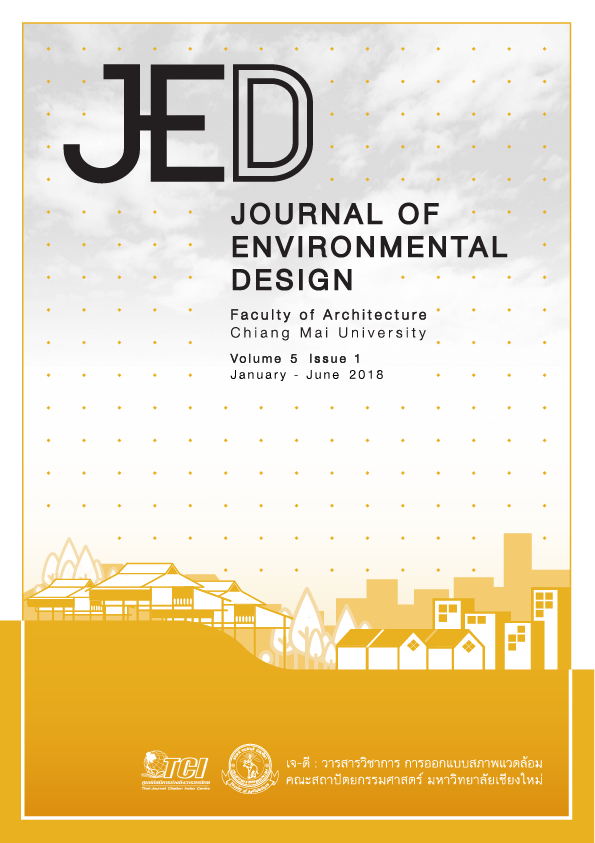การศึกษาคุณค่าบ้านไม้พื้นถิ่นเชียงคานเพื่อการอนุรักษ์ด้วยกระบวนการมีส่วนร่วม
Main Article Content
บทคัดย่อ
บ้านไม้พื้นถิ่นถือเป็นมรดกทางวัฒนธรรมและทรัพยากรการท่องเที่ยวที่เป็นเอกลักษณ์ของเชียงคาน แต่ในขณะเดียวกัน ที่ผ่านมาบ้านไม้เก่าถูกขายให้กับนายทุนต่างถิ่น บางหลังโดนรื้อทิ้งเพื่อสร้างอาคารรูปแบบใหม่ บางหลังถูกปรับเปลี่ยนการใช้งาน ทำให้เกิดการทำลายทุนทางวัฒนธรรมของตนเองอย่างรู้เท่าไม่ถึงการณ์ นอกจากนี้ยังขาดวิธีการสื่อสารคุณค่าของบ้านไม้พื้นถิ่นให้ทั้งนักท่องเที่ยวรวมถึงคนในชุมชนเองได้รับรู้ ส่งผลให้นักท่องเที่ยวส่วนใหญ่มาเยือนเชียงคานเพียงเพื่อถ่ายรูปกับบ้านเก่าแล้วก็กลับโดยไม่ได้เรียนรู้คุณค่าแท้ของเชียงคาน สถานการณ์เช่นนี้จะนำไปสู่การล่มสลายของวัฒนธรรมและการเป็นแหล่งท่องเที่ยว การศึกษาคุณค่าบ้านไม้พื้นถิ่นเชียงคานเพื่อการอนุรักษ์ด้วยกระบวนการมีส่วนร่วม เริ่มต้นจากการศึกษาคุณค่าของบ้านไม้พื้นถิ่นเชียงคาน และร่วมเรียนรู้กับชุมชน นำไปสู่การคัดเลือกบ้านไม้ที่เหมาะสมจำนวน 2 หลัง เพื่อนำมาสร้างตัวอย่างของการอนุรักษ์และพัฒนาให้เกิดเป็นแหล่งเรียนรู้ในลักษณะพิพิธภัณฑ์มีชีวิต ตลอดจนลงมือลงแรงอนุรักษ์ร่วมกันผ่านกิจกรรม “โฮมแฮง” โดยชาวชุมชนและผู้เกี่ยวข้องจำนวนกว่า 60 คน ส่งผลให้ชาวชุมชนเชียงคานมีความต้องการอนุรักษ์และพัฒนาบ้านไม้พื้นถิ่นเพื่อสร้างเป็นแหล่งเรียนรู้ในลักษณะนี้ขึ้นอีกหลายแห่ง รวมถึงบ้านที่มีภูมิปัญญาท้องถิ่นที่น่าเรียนรู้ เช่น ผ้านวม การจักสาน การประมง อาหารท้องถิ่น เป็นต้น เพื่อประโยชน์ของเมืองเชียงคาน ทั้งในด้านการสืบสานมรดกวัฒนธรรม และในด้านการสร้างผลิตภัณฑ์การท่องเที่ยวแบบสร้างสรรค์
Article Details
เอกสารอ้างอิง
ICOMOS. (1999). Principles for the preservation of historic timber structures. Retrieved November 9, 2017, from https://www.icomosthai.org/charters/wood_e.pdf.
ICOMOS Thailand. (2007). The ICOMOS charter for the interpretation and presentation of cultural heritage sites, proposed final draft. Retrieved November 9, 2017, from http:// icomosthai.org/charters/Ename%20Charter%20_Thai.pdf.
Khanjanusathiti, P. (2009). Karn anurak moradok sathapattayakam lae chumchon. (In Thai) [Conservation of architectural heritage and community]. Bangkok: Chulalongkorn University Printing House.
Phantawee, C. (2010). Kan sueksa ruen rankha phuenthin muang Chiang Khan nai thana kwamsongcham khong chumchon. (In Thai) [The study of vernacular shop house in Chiang Khan as the community’s remembrance] (Master’s thesis). Bangkok: Silpakorn University.
Piggot-Irvine, E. (2016). Focused action research based goal pursuit: The secret sauce in great performance review. Encyclopedia of Strategic Leadership and Management (pp. 861-876). Hershey, PA, USA: IGI Global. doi: 10.4018/978-1-5225-1049-9.ch060.
Tanming, N. (2009). Prawattisat lae trakun muang Chiang Khan. (In Thai) [History and Chiang Khan ancestor]. Loei: Muang Loei Press.
Tilden, F. (1977). Interpreting our heritage. (3rd ed.) Chapel Hill: University of North Carolina Press.


